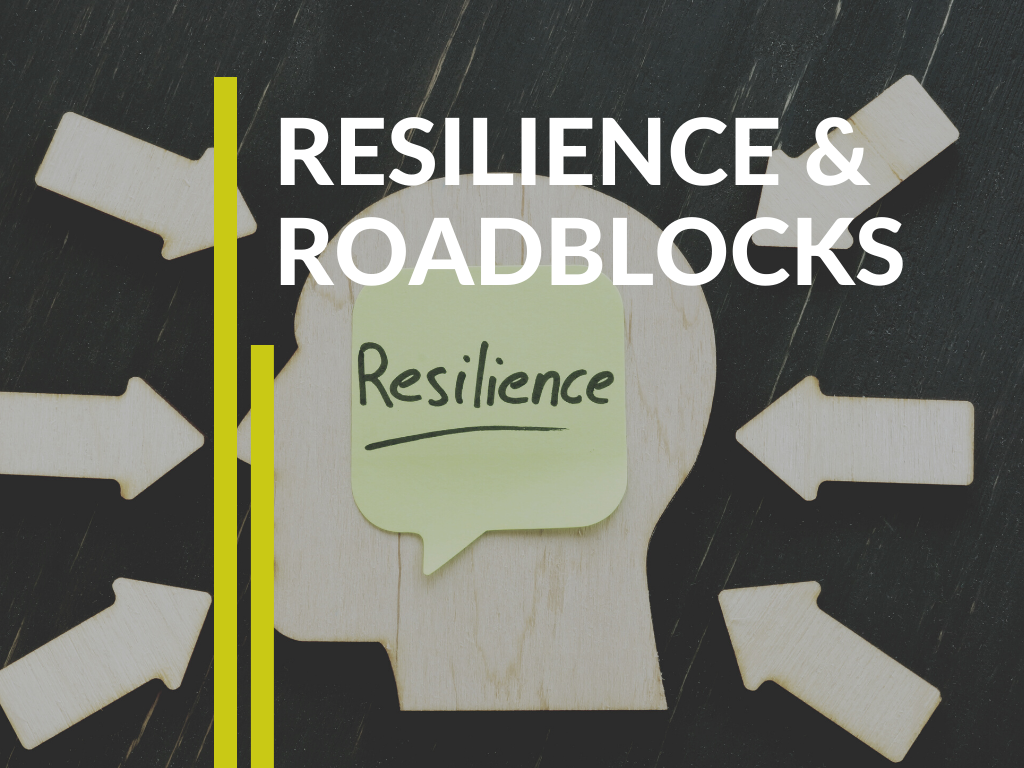Resilience and Roadblocks
Resilience and Roadblocks. How to Set Yourself Up to Be Inspired by Your Obstacles.
After the year we had in 2020, everyone continues to talk about resilience. How do we face obstacles, setbacks and adversity while maintaining our motivation to keep moving forward? While there are many strategies to deal with adversity, if you can master this one trick, you’ll conquer adversity before you even face it.
Being Pessimistic Might Help Sometimes
Pessimism is usually regarded as the antithesis of positive thinking and ongoing resilience, but when we’re planning – either for our goals or just the day ahead – it has been shown to greatly increase our chances of meeting challenges head on and coming out on top.
Research shows that athletes who are facing a tough event – let’s say they are about to run a very painful, flat-out 400 metre race – have two different ways they can approach the challenge. Option one is just don’t think about the pain – ignore it and it won’t be there. Or perhaps think “I’ve been training really hard – maybe it won’t hurt this time.”
Option two involves the athletes taking a more realistic approach and then deciding how they are going to handle it. They might say “Ok, I know this is going to hurt, especially with about 150 metres to go. When I get to that point I am going to focus on my technique and think about all the training I’ve done.”
Who do you think performs better? The athletes that take option two.
Priming Ourselves for Adversity Reduces Pain
If we’re ready for the thing that hurts, then our pain tolerance goes up. And this is true for both physical pain – like the 400-metre runner – as well as emotional pain like getting some bad feedback from your manager. But if we’re not ready for it, or worse, if we believe it won’t hurt, it can blindside us with an unexpected slap to the ego.
In practice, you might start your day and have a meeting with a client who hasn’t been happy, or you might have a meeting that involves a difficult conversation with a staff member. Or, on a less obvious level, you might need to work on a project today that you’ve been procrastinating on for a week and now it’s time to bite the bullet.
Knowing Your Adversity Strategy is Key
The cherry on top of just ‘knowing’ it will hurt is having a strategy at-hand to deal with the situation. Our 400-metre runner knew exactly what she was going to do (and say) when she met her adversity with 150 metres to go. We can do the same in situations in the workplace. With our unhappy client we might have a strategy to say, “tell me more about that” and take some notes so we don’t give into our natural defensiveness. With our difficult staff member, we might decide that we are going to bring the conversation back to basics when we get side-tracked. Or, when we find ourselves procrastinating, we might have a strategy to just get started with a 30 minute un-distracted effort.
This works so well because, when we are under pressure, we find it hard to think straight and so we become reactive. This process of thinking allows us to do our straight-thinking prior to the situation when we aren’t under pressure.
Applying This to Goals
On a more long-term level, we can implement this for behaviours that we want to change enroute to a goal. If you want to start going to the gym in the morning, but you know you find it hard to get out of bed, think about what you are going to do, say or focus on when you hit that alarm.
If we a) know what is going to challenge us and b) have a strategy ready to deal with it then the research shows that we are about 300% more likely to execute on our behaviours and keep moving forward.
Step it Up with Rewards
And if you want to make this even more potent, give yourself a little reward or acknowledgement when you face this hard thing and you are able to overcome it. And in this way, you can take those obstacles that are usually de-motivating and use them as a process to keep you feeling a sense of achievement. The trick is to acknowledge something is difficult and that you overcame it. There is nothing like small wins to keep us moving forward.
These strategies are for anticipated adversity situations. In a future post, we’ll talk about tackling unforeseen obstacles.
In the meantime, if you want a great framework thinking about your goals in a way that allows you to foresee the roadblocks and use them as fuel to keep performing, then download our Goal Template here.
